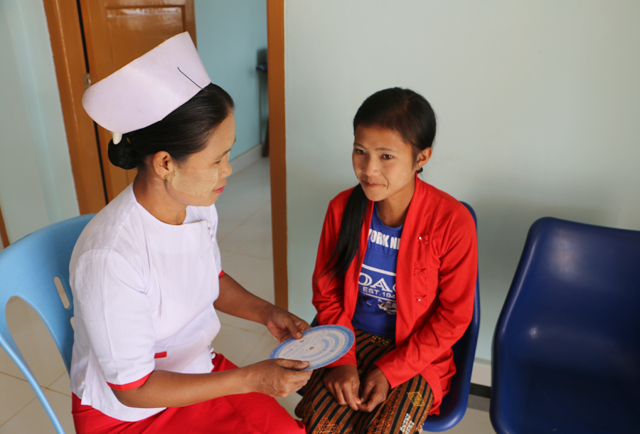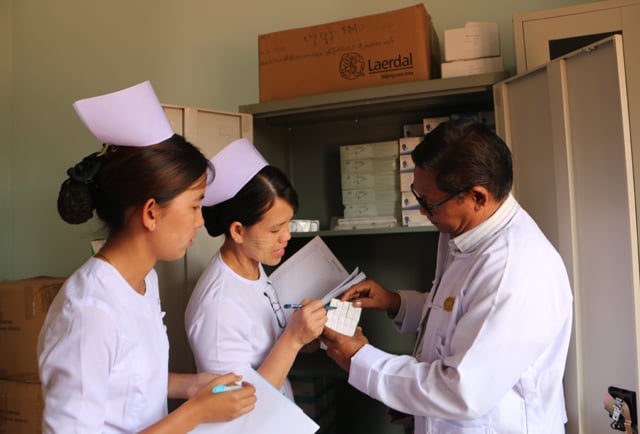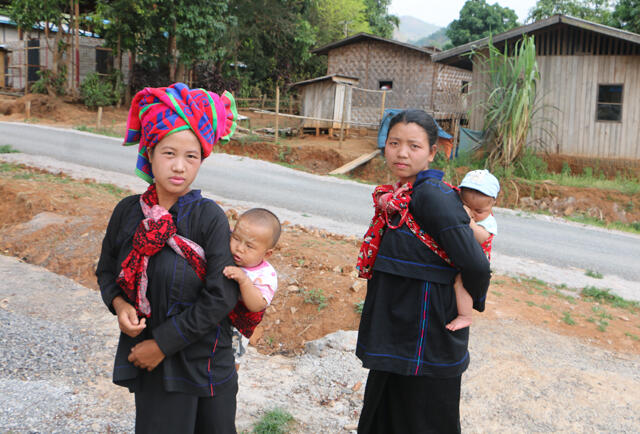It is in the late afternoon when Nan Aye Aye Lwin visits the Nam Khoke Rural Health Centre, after walking the three hours from her little hamlet. Nan Aye Aye Lwin comes with anxiety. She already has two children and does not wish to bear another for the time being. She wants contraceptives. But having to depend solely on her husband’s income as a seasonal laborer means she cannot afford to buy them. At the health center, a midwife explains the contraceptive options. Together they opt for the 3-months contraceptive injection.
“It is free - no need to pay. Better still, I am also told that from now on I can get it regularly in my home when the mobile health team visits my village. We can now start family planning. It is very good for us”, says Nan Aye Aye Lwin.
Until recently, the health center could not always offer the contraceptives women wanted because they were out of stock. Now, for the first time in her career, the Senior Midwife Daw Kyu Kyu Thin feels confident that she can meet the modern methods of family planning needs women in the surrounding villages. A new national logistics system has moved distribution from a push system based on centrally estimated quotas, to a pull system based on actual demand. Special attention is given to rural health facilities in remote areas. These need larger stock on hand that will last through the rainy season when transportation is limited.
Contraceptives are no use sitting on a shelf, going out-of-date when women have unmet needs

Myanmar’s maternal mortality ratio of 282 per 100,000 live births is the second highest in the region. A significant decline in maternal mortality would be achieved if women had the choice to give birth to fewer children. But contraceptives are no use sitting on a shelf, going out-of-date, in a central storage or in an over-stocked facility. Given that 16% of women have said that they want contraceptives but cannot access these, there must be functioning systems in place to ensure that they reach the women who need them get contraceptives supplies according to their choice. In 2016, UNFPA worked with the Government and John Snow, Inc. on the roll-out of the Reproductive Health Commodity Logistics System (RHC-LS). Piloted in 2014 with UNFPA support, the RHC-LS brings together logistics management information and inventory control under one umbrella. The system standardizes quantification, procurement, storage, and distribution while strengthening management and coordination structures.
By the end of 2016, the system was expanded to 72 townships in six states. 4,128 basic health staff had been trained to use the system. As a result, the percentage of health facilities with adequate stock increased from 4 per cent to 39 per cent in RHC-LS townships between 2014 and 2016. The percentage of health facilities with stock-outs decreased from 50 per cent to 20 per cent. This information comes from health facility assessment surveys. UNFPA supports these national efforts to monitor and evaluate investments and their progress. By 2018, the RH-LMIS will cover the entire country.
“We can easily identify surplus stock, and arrange for transfers”

Dr. Maung Maung Thein, the township medical officer in Hopong uses the online system to monitor the reproductive health stock situation across the township, including in rural and sub rural health centres. The same is done by public health staff at the higher district and region levels.
“This gives us a lot of flexibility in distributing and sharing resources. When there is need in one facility, we can easily identify surplus stock, and arrange for transfers”, says Dr. Maung Maung Thein.
Daw Kyu Kyu Thin and the other midwives at the rural health centre attended the system training in August 2016. She says:
“The good point of RHC-LS is that field health staff spend much less time in tracking, and entering the records. We can now do more mobile clinic visits. And we consistently have enough stock of the Depo injection, as well as of other medicines for pregnant women and mothers, to bring with us.”


